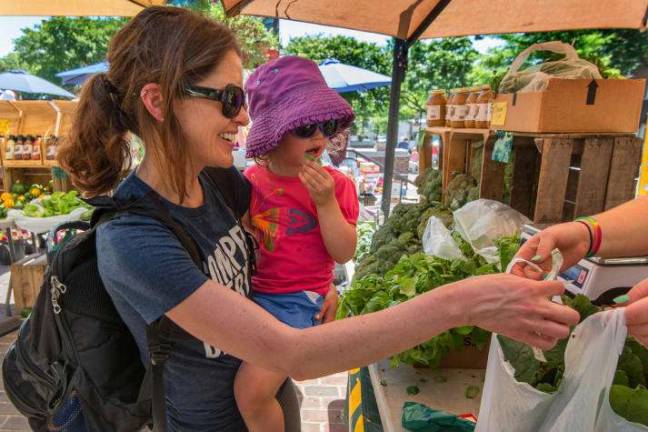An easy way to eat healthier this summer: Find a farmers’ market

When you visit a farmers’ market, you're exposed to all kinds of fruits and vegetables you may not see in your local grocery store.
"You may try things that you would not normally eat," said April Bowling, a doctoral student at Harvard T.H. Chan School of Public Health.
Bowling and her colleagues have studied the effects of farmers’ markets on residents of inner city neighborhoods. In an article published online, they reported the results of a study conducted with Farm Fresh Rhode Island — a food system that supports 11 farmers’ markets in cities across the state. Farm Fresh Rhode Island enrolled 425 families in a program to see whether providing a financial incentive — $20 to spend at a farmers’ market at every third visit to the market — would encourage them to shop at the markets more frequently and to consume more healthful foods.
The research team surveyed a representative sample of 146 people when they entered the program early in the summer and at the completion of the season in late fall. On average, the people reported they had lowered their daily soda consumption by 25 percent and increased the amount of vegetables they ate by 12 percent. More than a third of the participants cited their kids’ willingness to eat more vegetables as the most important reason they stuck with the program. Almost a quarter mentioned the financial incentive.
It’s not surprising that farmers’ markets are steering people toward healthier eating. The 2015–20 Dietary Guidelines for Americans advises a gradual shift to a plant-based diet centered around vegetables, fruits, and whole grains. Moreover, produce may even be less expensive than at the supermarket, and an increasing number of farmers’ markets participate in the federal Supplemental Nutrition Assistance Program and accept electronic benefit transfer (EBT) cards.
The bonus benefits
Farmers’ markets do more than offer a unique selection of fresh produce; they also provide an environment that’s conducive to smart shopping.
“There’s a culture that’s specific to farmers’ markets,” Bowling says. “You’re surrounded by other customers who are making healthy choices and by farmers who have grown the produce and know how to prepare it.”
Many farmers’ markets offer cooking and educational programs for children. You may find local musicians playing, activists circulating petitions, and people handing out notices of upcoming events. They’re great places to cement a connection with your community, which has its own health benefit.
Find a farmers’ market near you by following this link to the U.S. Department of Agriculture website: http://bit.ly/228MqcH.